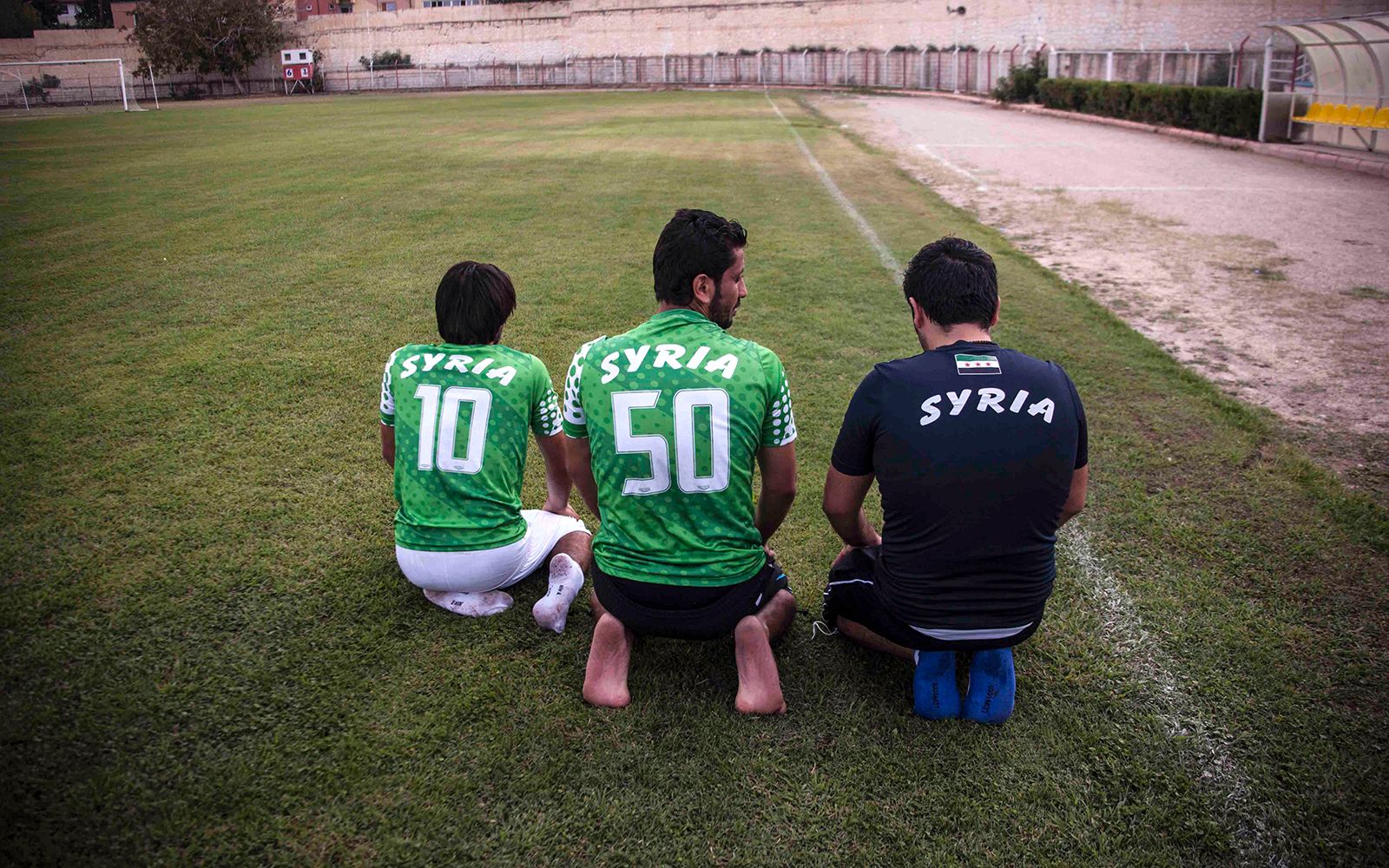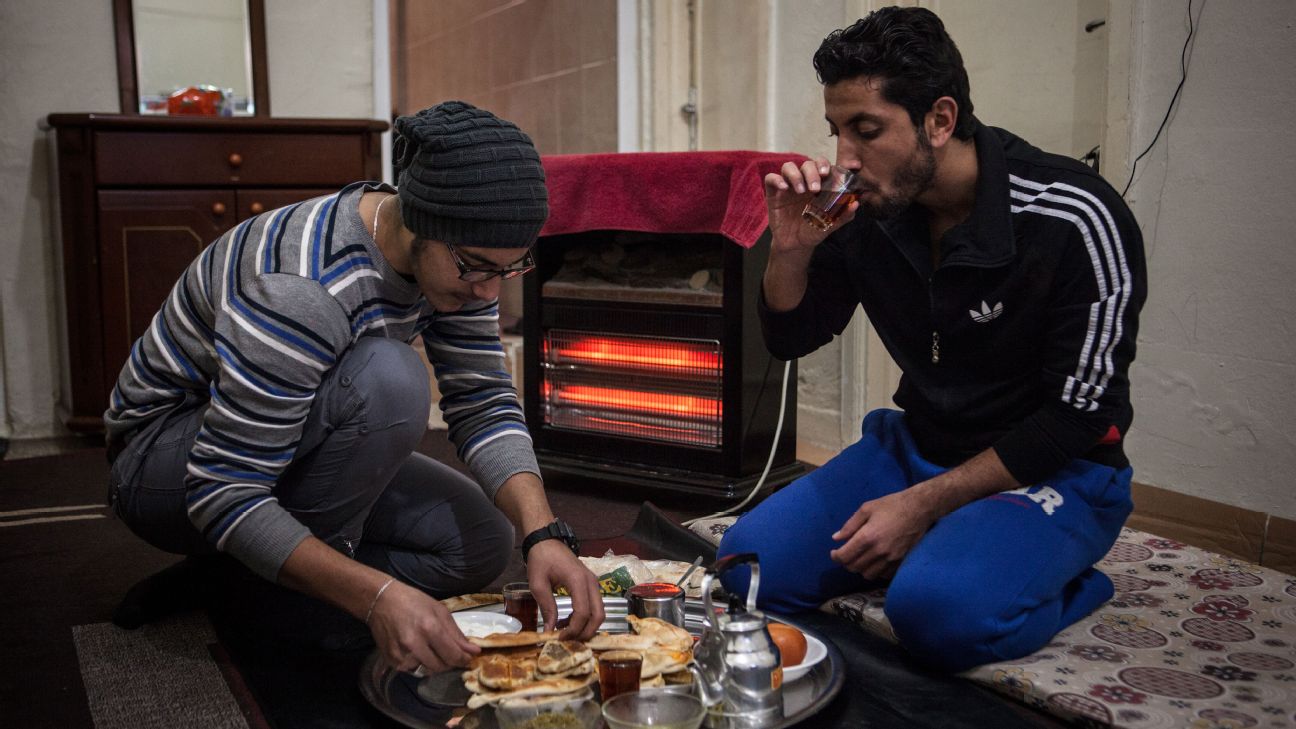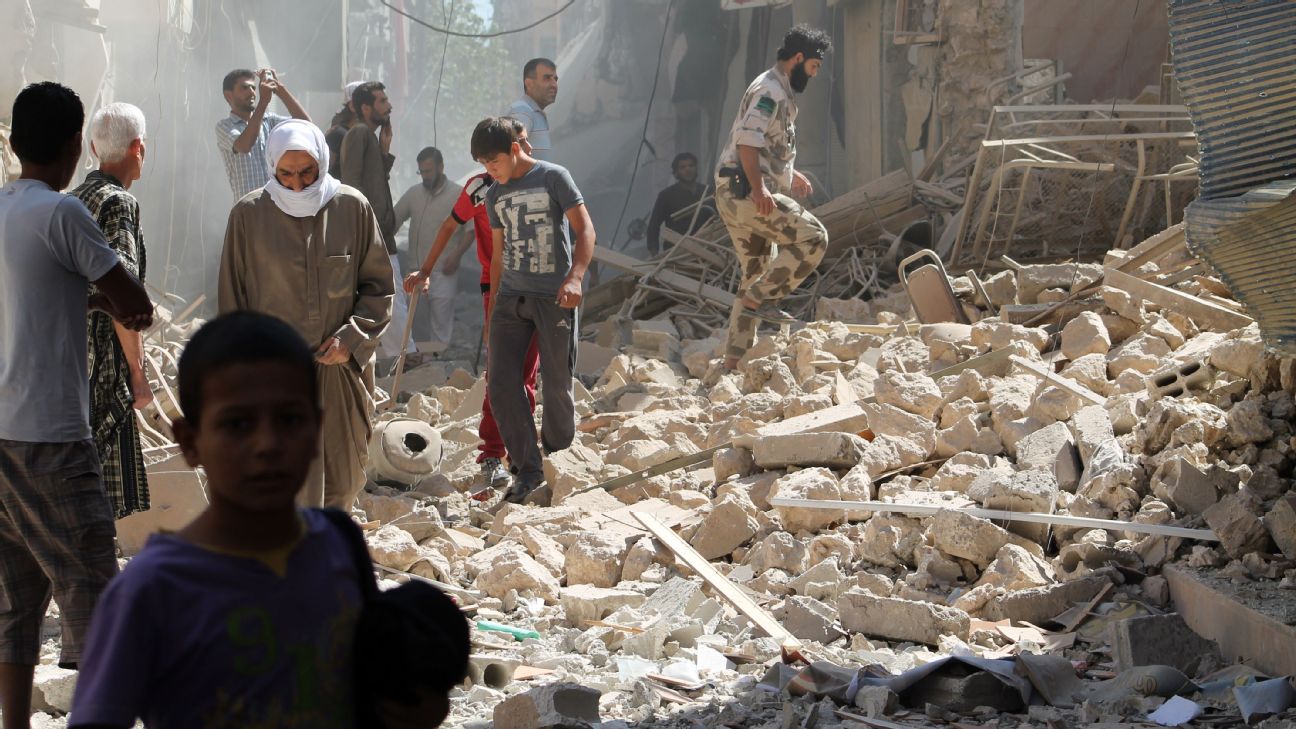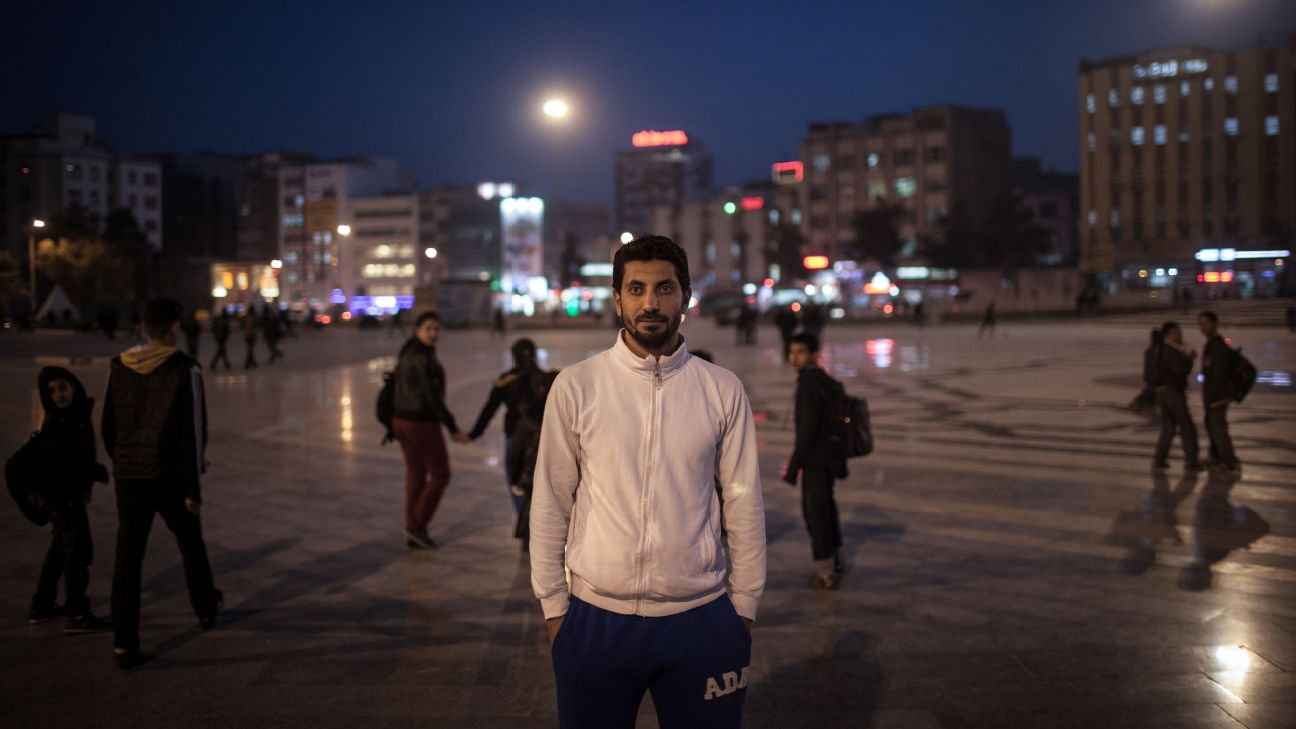
The Fevered Dream Of A Freedom Fighter
Syrian pro soccer player Jassem Al-Nuwaiji fled to Turkey to fight for his country -- only to find that his future is more unsettling than his past.
Editor's note: This story contains explicit language.
This story appears in ESPN The Magazine's June 6 World Football Issue. Subscribe today.
It was amazing, really, how quickly he escaped the war zone. That's what struck Jassem al-Nuwaiji after he had finally left his home. His trip to the border had been long, 267 miles by car and foot, but at the moment he arrived, it was simple. He just approached the fence and looked for the hole. It was right where the smuggler said it would be. A wide swath, easy to walk through: on one side, Syria; on the other, Turkey. He stepped across the line.
And then, when the border police started shooting, he ran. The forest was thick. Bullets struck the trees all around him. He sprinted until exhaustion set in, then noticed the shooting had subsided. "Small problem," he says, grinning as he tells the story later. When asked for a big problem, he shrugs. In a war, by the time you realize you have a big problem, you're probably already dead.
IT'S OCTOBER 2015, a Tuesday, and Jassem is at soccer practice in his new home of Gaziantep, Turkey, ready for one of his first training sessions since he gave up his professional career a few years ago. His hair is black and gelled, his eyes big and brown and searching. He lingers at the edge of a trash-strewn field until his coach approaches, potbellied and balding and beset with a put-on snarl. The coach talks to the team about clean passes and tough defending and the forceful overthrow of Syrian president Bashar al-Assad.
Jassem came to Turkey hoping to replicate the sense of community he discovered during the isolation of the Syrian civil war. The movement for freedom there offered him a calling greater than even soccer, and for months he witnessed something almost beautiful among the resistance fighters of his hometown, fighting on amid that much blood and overwhelming odds. But war's destruction is total, and the sense of camaraderie became a casualty, as surely as the dead and wounded who fell around Jassem. These days, in Turkey, he's struggling to reclaim that piece of himself he discovered and lost in the civil war. He doesn't know whether this team will help him find it, but he's hopeful. His cleats fit. His jersey is resplendent and green.
He walks out to midfield, where the players huddle. Jassem sticks his hand in the middle with the rest of the team. Syria! someone shouts. In unison, they all join.
Syria! Syria!
Free!
Free!
Free!
They call themselves the Free Syrian national team. Founded by former Syrian sport officials, filled with ex-pros and based here in southern Turkey, the club aims to earn FIFA recognition and supplant Syria's official national team, which is backed by the country's dictator, Assad.
This is why Jassem is here. He sees soccer as a tool for revolution. Score goals, win games, topple a dictator -- even from the remove of another country. It's all connected; everything is war. He rejects the label "refugee." He fled Syria only to save it. "Sport," he says, "is even more powerful than military action. We are painting the struggle of the Syrian people for the entire world."
After just a handful of practices, Jassem crawls into the back of a van with his teammates, bodies crushed together and windows down. It's impossible for even the men in this van to quantify the full cost of the Syrian civil war. It began in 2012 and continues without end, a Gordian knot of tangled interests fighting it out in the same theater: a dictator desperate to keep power; an army of rebels fighting for democracy; foreign governments with competing agendas; insurgent jihadists with terroristic dreams. As they seek their own ends, over 470,000 Syrians have died, slightly fewer than the number of Iraqis killed in the decadelong U.S.-Iraq War. All Jassem and his teammates hear are world leaders in European parliaments and on American campaign trails debating what, exactly, they're willing to do to help -- and they see those leaders shrug their shoulders to say, Sorry, not very much.
The van reaches the highway and civilization disappears, replaced by a parade of softly rising hills, brown and arid. Jassem stares out the window, his body moving with the rhythms of the road. After a couple of hours, they arrive at a small stadium in the town of Nizip, and they walk inside for an exhibition match against the Turkish amateur club Nizipspor.
Jassem starts at forward, and he darts in and around the box whenever the Syrians control the ball. It's his first organized match since the war began, and it shows. Years ago, Jassem scored acrobatic goals all across Syria and in leagues around the Middle East, taking on defenders with a feather touch and preternatural vision. In his hometown of Deir Ezzor, fans carried him out of the stadium on their shoulders. Children mobbed him in the markets and the streets. There in his working-class city, celebrity was something small and intimate. Jassem believed each fan was his friend.
But here he's anonymous and rusty. He tires quickly. His touch fails him. Yet even far from his top form, he's among the best players on the team, possessed with a kinetic confidence. He assists on a goal, a well-timed pass buried by a teammate, and he earns several more chances of his own. The game ends 1-1, a fair result for a newly formed club.
But if this team is painting the face of the Syrian revolution, its work is hidden. Only one reporter is here, surrounded by just a few dozen fans.
Yet Jassem seems pleased. He walks off the field, smiling and light-footed. "This is only one game," he says. With more games will come more publicity, he believes, more funds, more opportunities to show their quality and spread their message to the world. He drapes his arm around the back of a teammate. "We just need time."

After practices, Jassem and teammates would share meals and stories of the war. Erin Trieb for ESPN
THAT NIGHT THEY eat takeout. Flatbread and hummus, chicken and rice, all from the closest Syrian restaurant, delivered by team staffers to Jassem's dorm room, where a small group sits, scattered around the floor, telling stories.
Someone asks Jassem whether he remembers his first demonstration, and he smiles and nods. It was fall of 2011. The protests against the corruption of Assad's government had begun in other parts of the country months before, part of the democratic fervor of the Arab Spring, spreading slowly and gathering momentum by the week. People fled the city of Homs and settled in Jassem's Deir Ezzor, 227 miles to the east. The refugees talked about massacres, crowds sprayed with bullets by shabiha, unofficial government thugs.
Jassem had loved his country. He'd trained with the national team, wearing its flag and singing its anthem, welling with pride. But the stories from those arriving in Deir Ezzor -- of government forces slaughtering civilians -- left him unsure of exactly what "Syria" had ever been.
One night he and his friends decided they'd heard enough. Jassem went to a drawer in his house and pulled out a checkered black-and-white kaffiyeh. He wrapped the scarf around the top of his head, then down across his ears and nose and mouth, leaving only a small slit for his eyes. The scarf was tight and its fabric itched, but Jassem couldn't risk being recognized.
He walked outside. His friends joined him. His chest thumped and sweat soaked through his scarf, the air hot and alive. They joined a larger crowd, marching together, and as they moved they began to scream.
The people want to topple the regime!
God! Syria! Freedom and nothing more!
They passed neighbors gathered around rugs on the street, drinking tea and begging Jassem and his friends to please stop. The army will come, they said. They will kill us. Jassem ignored them, swept up by the crowded streets and the people like him who screamed such dangerous words.
"I felt," he says, "like I was flying."
Years later, sitting in this tiny apartment with his new club, Jassem glows as he tells the story. His teammates look on, grinning and enthralled. Many of them had just hit puberty in 2011 -- it's difficult to remember the days before revolution became war. Now they listen as Jassem returns them to a time when Syria's potential seemed limitless. "It was very fun," he says, smiling.
But war came to Deir Ezzor that summer. Syria's turmoil confused and thrilled Jassem. He recounts to his teammates how he went to protests, to prison and to soccer practice, once all in the same day.
The country fractured. Western-approved rebels controlled some areas, hard-line Islamists others, and almost everywhere, those groups splintered and overlapped. On a map, Syria looked like an ever-changing puzzle. On the ground, it felt simpler: men patrolling their neighborhoods, imposing their will.
“If you wanted to play football, you had to pledge allegiance to ISIS.”
- Jassem al-Nuwaiji
Jassem volunteered alongside the Free Syrian Army, a rebel faction that supported democracy and opposed both Assad and the region's theocratic extremists. He fired his Kalashnikov a few times, but he says he never killed anyone. Instead, he helped in whatever capacities the war required, retrieving medical supplies, delivering food and digging through rubble each time the bombs fell. At the war's peak, he lost friends or acquaintances almost daily. Death was so ubiquitous that its horrors numbed him. At first, he had taken shelter every time he heard a bomb fall. Within months, he accepted explosions and gunshots as the soundtrack to his daily routine. "If you can hear the bomb," he says, "that means you're still alive."
Death's nearness sharpened each moment into focus. Shelling flattened homes, and families moved in with other families. They watched Champions League matches on satellite, dozens of men crowded and screaming around the ultimate wartime luxury -- a working television. During Ramadan, families crushed together in small rooms lit by candles, breaking their fast at night with what little food they could find and share. The bread seemed decadent. The continuation of long-held traditions felt like a middle finger to the regime. Relationships formed wordlessly, by simple proximity, stitched together by the intimate act of trying to help each other stay alive.
Jassem tells the room about his wife, of the day they married, when he wore a tux and listened to staccato gunfire and watched hundreds of people dance for hours on end. Soon she became pregnant. When she went into labor, winds whipped a sandstorm through the city. Fighting slowed, and after a seven-hour delivery, Jassem's son was born but with the umbilical cord around his neck. When the boy at last cried, Jassem took his very breath as support for the revolution.
Now, three years later in Turkey, as he sits and winds his way through these stories, he pauses for just a moment and looks down to choose his next words.
"Those were," he says, "the most beautiful days of my life."
And yet, horror lurked amid them. He remembers hospitals turned to rubble, streets littered with human limbs. He once walked through a regime prison and saw a man nailed through his hands to a wall. On another afternoon, he witnessed a young girl, perhaps 6, who slipped through her father's grasp and took off running down an open road. Jassem watched her for a few steps until her body jolted and then dropped, shot and killed by a regime sniper.
While he tells the story, Jassem looks away, then stares down at his own hands. "It wasn't enough to kill," he says, and then he looks back up and his face hardens. "They wanted to show artistry in their killing." What he remembers most clearly are the moments immediately after she fell to the ground, dead. The sniper kept shooting. With every new bullet, her father screamed as the girl's tiny body appeared to dance.
10/14/2015: FSF in the changing room before the start of the friendly match with Killis team. FSF still trying to get registered and official recognition from FIFA, but till no their attempts failed. Omar Alkhani for ESPN
Jaseem Al-Nuwaiji exercises his legs with a stretch band at his Aunt's house where he stays in Sanliurfa, Turkey, on Feb. 6, 2016.
Erin Trieb for ESPN
Omar Alkhani; Erin Trieb (2)
BY EARLY 2015, both Assad's army and the democracy-supporting rebels had lost control of Deir Ezzor. Black flags now whipped high above the streets and hung from homes and public squares. The flags represented a new group that called itself the Islamic State.
In an instant, everything was forbidden, haram. Men wearing shorts above the knee, women walking alone, anyone playing music -- all haram. ISIS men kicked out beloved imams and replaced them with their own, men who lacked formal training but preached an ideology built on murdering those who opposed their beliefs. They indoctrinated locals -- teenagers, mostly -- through a 15-day course on extremism. Those who pledged allegiance to ISIS received better access to food, housing and jobs.
Jassem watched friends and neighbors take the pledge out of desperation. "They had no other way to survive," he says. Yet he refused to join them. He detested any perversion of his religion. Resisters, however, endured difficult lives under ISIS control. One afternoon, he was playing soccer with his friends. "In the middle of the game, the referee calls a foul," he says. "So all of us move out of the way to make room for the free kick. But while we're getting ready, some other guy walks onto the field. You can smell him before you see him -- those ISIS bastards all stink so bad.
"He walks onto the field. He's a kid, like 15, maybe. He's trying to grow a beard. He has a few pathetic hairs on his chin. He points to the referee and says, 'Is this referee judging the game according to the Quran?' We say, 'What do you mean, judging according to the Quran? This is football.'
"Then the ISIS guy points his finger at the player who committed the foul, and he says, 'Did he sin against Allah?' "
Now Jassem grins, scanning the room -- Can you believe this? -- then continues. "The ref says, 'No, he didn't sin. What are you talking about? It's just a foul.' " Jassem pretends he is the member of ISIS, puffing out his chest and wagging his finger and shaking his head. "'No, no, no.' He points at the referee. 'Either you must forgive him, or we will take him to prison.' " Here Jassem stands, his arms wide, as if experiencing this all for the first time. "Prison! For a foul?" He shakes his head. At last, the players were forgiven by the ISIS man. They took their ball and went home.
For a while, ISIS tolerated the continuation of sport. The group even formed its own teams to join unofficial rec leagues, until one day, Jassem says, some of his friends embarrassed the extremists. "I don't remember the score," he says. "Maybe 10-0. Maybe 15-0. Something like that. But the next day, when you went to the football pitch, a guard was watching over it." He wouldn't let anyone in. ISIS made a new law. "If you wanted to play football, you had to pledge allegiance to ISIS."
With ISIS in control of most of Deir Ezzor, the city's branch of the pro-democracy resistance began to dissolve. The Free Syrian Army's leaders either fled or were executed, and its supporters knew better than to speak out. Dissent was squashed. The city settled into an uneasy quiet.

Syria's turmoil confused and thrilled Jassem. He recounts to his teammates how he went to protests, to prison and to soccer practice, once all in the same day. Ahmad Aboud/AFP/Getty Images
WHEN JASSEM GOT the invitation from a friend to travel to Turkey and join the Free Syrian national team, he immediately accepted. Soccer represented his greatest talent, the revolution his deepest passion.
The team pays him $500 per month. It houses him in a one-bedroom apartment he shares with another player. Two smaller-than-twin-size beds, a couple of flimsy chairs, a sink, a tiny TV and a toilet -- it's nothing like the five-star hotels where the official national team stays, but Jassem lives with a clean conscience. He hears fighter jets sometimes, heading south from Turkish bases to drop bombs in Syria. The sound of violence soothes him, a reminder of home.
Every day, he checks the news. The Russian army intervenes in Syria, using its vast resources to prop up Assad. The Islamic State group maintains power in his hometown, and ISIS-affiliated terrorists attack Paris, killing 130 people and sending much of the world into panic.
Jassem saves a little money, which he sends back to his wife and children, now living in a safer part of Syria. There are more practices, more games, a few goals. Yet the Free Syrian national team's reality falls short of its lofty ideals. The talent pool remains shallow, the crowds sparse, the competition weak. His dream of representing a Free Syria in the World Cup is barely any closer than it was before he left home. But that's OK. "We only need time," he says, as if willing his own hope into existence. "We are still building this team."
Then, on Dec. 23, the club's founder, Anas Ammo, calls the Free Syrian team together for a meeting. He announces that their contract with the Sankari Humanitarian Foundation, the one that paid the bills and funded the schedule, has expired. The contract won't be renewed. Ammo says the team will go on hiatus -- hopefully just a few weeks.
Jassem is stunned, but he tries to remain optimistic. He wants to believe that this team can still make it. He speaks by phone from Turkey one night, and his voice carries tones of desperation and fleeting hope, which coalesce into something rabid and pleading. The conversation becomes a wild search to justify leaving his country and family and beloved resistance fighters behind. "We will show the world who the Syrian people are," he says of his defunct team. "I think it will be two days. Maybe three. Then we will be back together."
WEEKS PASS, NEARLY each day the same. He wakes up on a thin mattress and eats breakfast paid for by the generosity of friends. He walks a few blocks to the office of the Deir Ezzor United Association, a nonprofit that funnels money from Turkey to anti-ISIS dissidents in his hometown. It is here where he spends hours sitting in a chair and drinking tea, praying five times and waiting for news about his wife, his war and his team.
His family is safe, but his club remains on hiatus, so Jassem spends whole days scrolling through Facebook, staring at photos or anti-Assad memes. One Friday in February, he is in the office talking with volunteers about the Turkish people, the English Premier League ("Leicester has no chance") and the recent death of former Syrian first lady Anisa Makhlouf ("The witch is dead!"). Finally, they circle back to the same destination of almost every conversation: the war. They strike up a debate. Who's worse: ISIS or the Assad regime?
The regime is worse, says Jassem's friend Musab, a balding and soft-spoken man of middle age. "ISIS kills some people, but their main goal is to make everyone afraid," he says. "The regime just wants to kill everyone." Jassem shakes his head, finally pulled from his malaise. "ISIS is worse," he says. It is more sinister, he says, "because they claim to represent Islam." The world sees ISIS as a theocratic menace, a ruthless organization capable of bending Western civilization to its will. Up close, the view is different. "They're just a bunch of assholes carrying guns," Jassem says.
Mocking ISIS occupies large stretches of the afternoon. Jassem tells the story of the day he spent in an ISIS prison, all because a fighter had walked into the restaurant where he worked, ordered a sandwich, taken a bite, declared it disgusting and promptly arrested every single one of the restaurant's employees. Jassem smiles at that one. "See what I mean?" he says. "Assholes with power."
Each laugh, though, is set against a backdrop of more terror. Even here in Turkey, ISIS operatives lurk nearby. Last fall two friends were found in a local apartment, their throats slit. Jassem has been away from the conflict zone for five months, and he jolts each time he hears a loud noise. Yet there is comfort in a room full of shared trauma. Jassem admits something. In the end, when he decided to come to Turkey, it wasn't the fear that drove him away from home. It was worse than that. With pro-democracy fighters disappeared or dead, and ISIS in control of Deir Ezzor, depression set in for Jassem, a depression so deep that it stripped his will to endure each day. He fled to Turkey as a way to reclaim his desire to fight.
And now, five months later, in another country that still feels unfamiliar, he is again cut off from his people's battle. The fear of Syria is gone, but the depression lingers. "I worry about Jassem," his friend Mahmoud al-Jayyal says. "His body is here, but his mind is somewhere else. This is not the real Jassem here with us now."

Displaced and distraught, Jassem now fights to simply not lose hope. Erin Trieb for ESPN
HE TRIES NOT to let himself show bitterness. Each day he forces smiles, and when his troubles are mentioned, he deflects. He has little money, but he gives loose change to child beggars. Charity is a pillar of Islam after all.
One night, he and guests pass around tea and spend hours in conversation, and in the middle of it all, his phone rings. Jassem stands, and he walks back to an open bedroom. He paces back and forth, his voice tense, his eyes down. After a few minutes, he returns. No one asks who called, and he doesn't tell them.
Only later, when prodded, does he say it. The call was from a teammate. "The team," he says, "is finished." There will be no new funding. No more matches, no FIFA recognition, no day when Jassem can claim on a grand stage to represent his people rather than Assad.
He walks through the streets, weighing options. He has no money or job. His family is a war zone away. He could return to Deir Ezzor, but the moment he sets foot back in his country, he'll invite death. He could find a job here in Turkey, but the government issues few work permits to Syrians. Any employment would have to be under- the-table. He could re-sign with one of his former clubs in Jordan or Oman. Coaches have messaged him on Facebook, showing interest. But for that, he'll need to travel to Istanbul and replace his passport, which was destroyed in the war. The trip and fees would cost about $700. It sounds like a fortune. He's idling and helpless, and soon he'll have no choice but to accept an identity that long repelled him. Jassem al-Nuwaiji, once a professional athlete and an even prouder freedom fighter, is now a refugee.
He looks down at his feet, silent. "I'm fine," he says. He looks back up, his face trying to stretch into a grin.
"Small problem."





